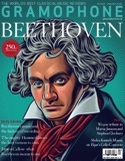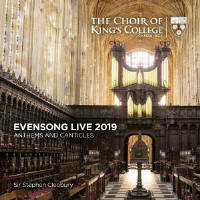Texte paru dans: / Appeared in: |
|
|
Outil de traduction (Très approximatif) |
|
|
Reviewer: Andrew Mellor If you’ve followed the ‘Evensong Live’ series you’ll know that the ‘live’ bit is more accurate than the ‘Evensong’ bit. There are no psalms, hymns, responses or prayers here, just meaty anthems and canticles harvested from services captured on King’s in-house recording apparatus. Here, we are in the last days of the Stephen Cleobury regime, with two works conducted by Christopher Robinson (who stood in while Cleobury underwent surgery) and one by Ben Parry. You can change the man in the middle, but you can’t change the ‘King’s sound’. Not in a matter of weeks, anyway. That sound is one many of us have known for a lifetime and which lays itself bare on the choir’s weekly webcasts, where these recordings were first published. Love it or loathe it, this choir has never looked you in the eye like its counterpart at St John’s. Its sound is an imperial one, with a sometimes cavalier brand of aloof confidence that can wave away musical intuition, true blend of tone and vowels and even accuracy of tuning. Text comes second to both sound ideals and the top line (bolstered by the acoustic), whose ‘floating’ tone can’t help but reduce the range of colours deployed. Weir’s Ascending into Heaven is diminished for that reason. Old habits die hard; the sudden burst of fortissimo vibrato on the first ‘Maaaaag-nify’ of Parry’s Great Service betrays a lack of interest, underneath the trebles, in letting the line build naturally; the Weelkes Magnificat is bereft of considered interpretative thought (again, focusing on text would help). But King’s is King’s, and its steadfast traditions – of sound production as much as procedure (as in the wholly counterintuitive pointing of its psalter) – is its wonder. Finzi’s Lo, the full final sacrifice rises and falls like yeast, even if its big chords obstinately refuse to settle. We get a taste of the choir’s bodily luminosity in Ley’s Prayer of King Henry VI, a King’s speciality delivered with a hint of atmosphere. The choir’s cold, brittle sound springs the Mathias Magnificat nicely out of its blocks and shows the extent to which ensemble and organist know how to utilise the space. Even in those problem corners, the choir’s nobility is propulsive and distinctive. Cleobury’s was a remarkable, historic, tenure on so many fronts and the tragedy of his untimely death has been felt even by those who never came into contact with him. He is already proving a near-impossible act to follow, but there’s no doubting the Daniel Hyde era offers a serious opportunity for renewal. Many will be listening closely. |
|




